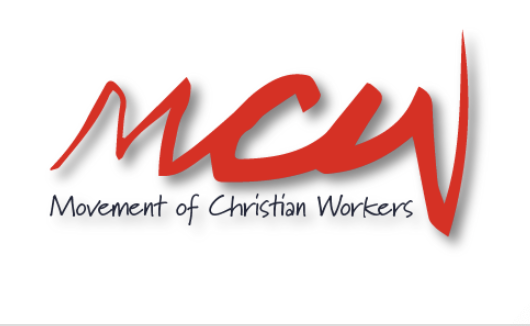The February 2021 bulletin from the WMCW (World Movement of Christian Workers) is entitled “The fight for justice”The various contributions from MCWs around the globe all reference or attribute their contribution to the definition of Decent Work by the ILO (International Labour Organisation).

Thus, the benchmark for the articles is “Remunerated work carried out in adequate conditions, in a system of freedom, equity and security. Decent Work should let workers and their families lead a decent and healthy life.” The Labours in the Vineyard is drawn upon to emphasise a just wage (Lk10:7) and in addition the explanation that the just wage to the last hour workers gave them dignity (Mt20:1-7). In a similar vein ‘Laborem Exercens’ stressed the social meaning of the just wage for the fruits of the workers’ labour recognised in the ‘Rerum Novarum’ encyclical. Each writer gives prominence to the need
for all type of work to be regarded with dignity along with the primary significance of a living wage as being central to the health and welfare of the worker and their families
.
From MCW’s perspective it is vital that we do learn the lessons of the past: That the absence of decent work effects the present and the future. Nothing could be clearer than the brutal effects of the pandemic because of wage cuts and pay freezes in conjunction with insecure, precarious, zero hour, and
‘gig’ economies of the austerity policies which went before. In view of the unprecedented level of unemployment and poverty, new job creation and training will no doubt be part of the government policies to kick-start the economy. Therefore, the essential elements of existing and additional jobs and training must include a yardstick for it being both decent work and work with dignity. Alongside this there is a necessity for all the interrelated support systems that have been dismantled over the years to be re-established.
It is interesting in an English context that when this Infor was circulated, the proposed pay rise described as narrowly for “nurses” or more broadly for “NHS staff in England”, has brought out such a widespread and extensive array of views with many variants in between. It can be difficult to know where to enter into this debate to either voice an opinion or clarify what is true. Firstly, whilst some talk about the staff and include porters and cleaners it maybe that they are not all included because of not being directly employed by the NHS. Secondly, the attitudes range from the 1% increase as being far too little, to a one off payment being preferable. This latter suggestion means that those on the lowest pay at least get the same “thank you” for being key or frontline workers during the pandemic. Thirdly, it opens up a far wider principle; that there were so many key and frontline workers, care workers in particular, along with supermarket staff, drivers, cleaners etc in jobs outside of the NHS that it is unfair to them that no wage increase is necessarily being considered. Last but not least there are also those arguing that if there is money available it should go to the unemployed and poor. Of course none of the workers’ roles or realities mentioned above is necessarily discrete as many will also already be living in poverty or be the working poor. So where do we stand in this 1% debate? Where do we begin? Surely, our intervention, our line of argument, starts at the heart of this debate. What underlies these deliberations is that whilst all the views are valid, what really is at issue is that there should be decent work for all which recognises and appreciates their dignity and all that this entails. Perhaps a good place to start reflecting on decent work with dignity is to read this edition of the WMCW’s Infor: ‘The Fight for Justice’.




